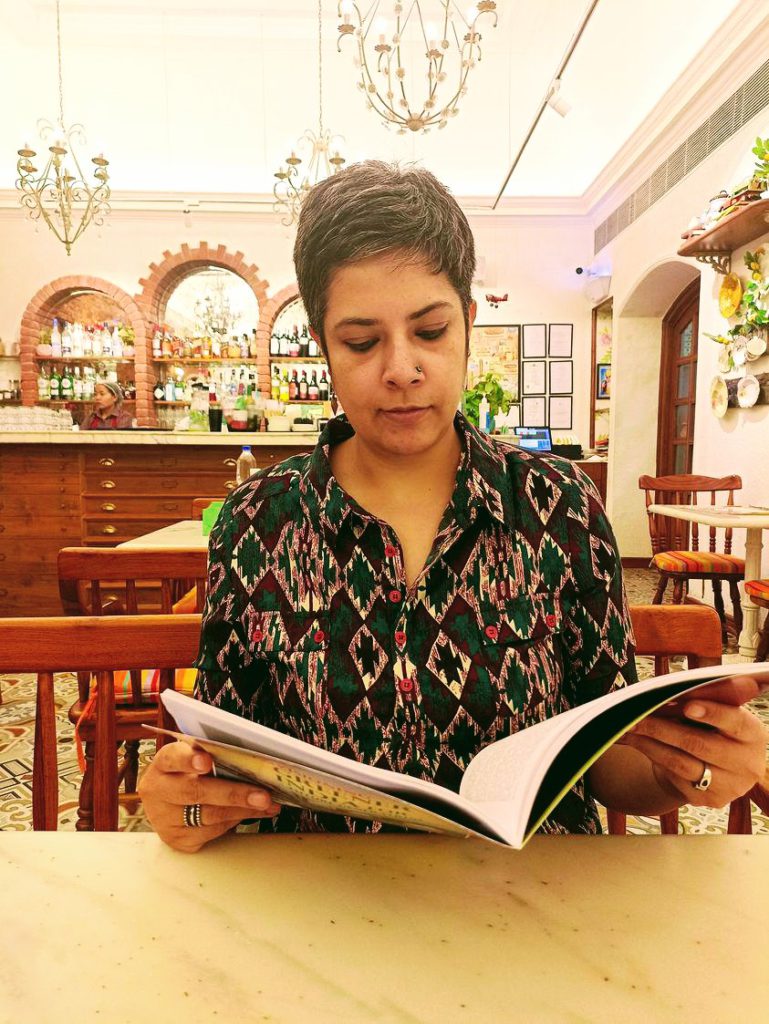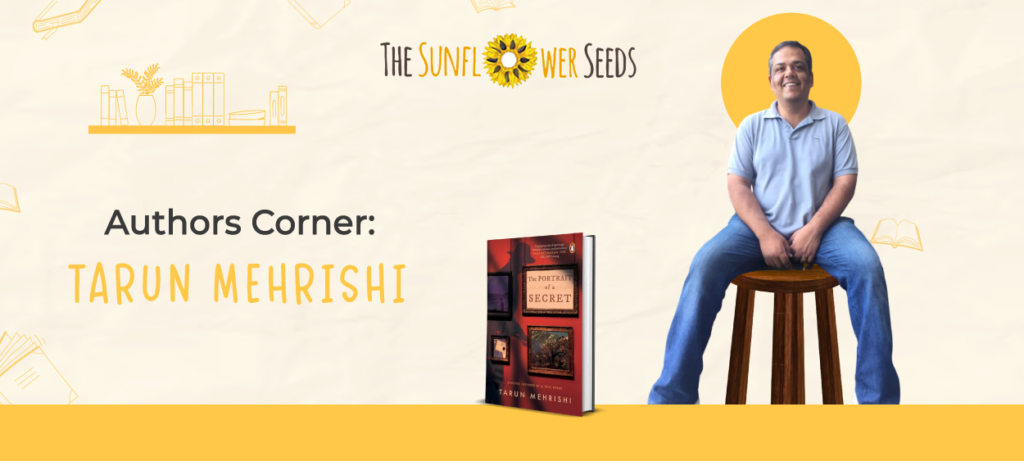“Sometimes you will find people all sitting quietly and reading something. They are not talking to each other, they are not on their digital devices and that is something very precious, that is something very heartwarming for us.”
Imagine a cafe filled with people wrapped in a comfortable silence – everyone is reading
No one talking, no one on their phones, no loud interactions, just several people reading.
Yes, this exists in 2023, this is the Pagdandi Cafe, which is right next to the Pagdandi Bookstore in Pune.
The bookstore and cafe promote literature in a way independent bookstores are supposed to. They don’t focus on bestsellers, instead keeping curated lists of books from big and small publishing houses. They have books to read in the cafe and a giveaway box for those who want to take a free book home and they try to promote a culture of reading.
Vishal Pipraiya, the co-founder of the cafe and bookstore, tells us about his novel concept and how he uses it to promote local literature.
How did you come up with the concept of Pagdandi?
So about 10 years ago in 2012, me and my wife and I settled in Pune. Both of us have grown up with books and books have had a big impact on our lives; also both of us are chai lovers. So in 2012, when we were in Pune, there was no space where one could go and explore different books, read different books, meet other people who would be interested in books over a cup of chai. In fact, there were no places with good ambience and with good sitting experience which used to serve our Indian style of chai. So we thought, “OK, since we don’t have such a place in Pune, why don’t we create one?” And that’s how the seed of the thought came of creating a place like Pagdandi.
So we started conceptualizing it. And then on 25th August 2013, we were finally able to launch the space where people could come. They could sit and read books while they order a cup of chai. They could meet other people who like reading books. They could discuss books with them and they could also borrow books and take them home. So a complete experience of a book space, you know, with a very homely environment.
Tell us about some of the things you do to encourage reading in the cafe.
So we have a big selection of books that people can choose from to sit and read in our reading space. We believe it’s one of the biggest collections in Pune to read from in a cafe environment and we very intentionally create an environment which is conducive for reading.
We don’t provide Wi-Fi.
We don’t keep board games because in that kind of environment, the energy is more excitable- people are more celebrating the victories or lamenting the losses- while for a reading environment, one needs a more peaceful environment.
We intentionally take some steps to create an ambience which is conducive to reading – even a simple thing like making people take off their footwear before they enter our space helps them slow down because reading is a slow activity and it’s really important for you to get into that mindset.
Steps like these create an environment and an ambience which is conducive to reading books other than of course having a lot of books for people to read from.
Tell us about the library and the takeaway box
Unfortunately, we had to shut down the library during COVID because we decided to concentrate more on the bookselling part. Until COVID, we used to do all of it- we used to be the reading room also, we used to have a lending library and we used to have the bookstore.
But after COVID, we realised that we wanted to work more on the bookstore front and if our energies get concentrated on the bookselling part, then, unfortunately, we cannot do justice to running the library. So we decided to shut down the lending part.
So we have two sections now- one is the bookstore which has all brand new books for sale curated by us; and we have the reading room, which has books which you can sit and read on the spot, but at the moment you cannot borrow and take them home, you have to read them in the premises itself.
When I was a student, I realized that, you know, buying books was quite expensive and one was always falling short of financial resources. My reading habits were much higher and my wallet was not able to keep pace with it.
With that in mind we recognise that some portions of our society might not have access to books.
What we were thinking of doing is creating this takeaway shelf outside our store, which is open 24 hours, seven days a week, 365 days a year.
We do not take that shelf inside. It does not get locked and we keep books on that shelf that people can just take away with them, no questions asked. It’s theirs forever if they choose to take the book.
We keep filling up the shelf with our selection of books. There are a lot of generous people in the city who donate their books to us, and some of them might find their way into our reading room and some we keep in the takeaway shelf.
So that’s kind of a small effort from our end to promote the reading culture in the city.
I understand that you don’t keep bestsellers, do elaborate on why.
Well, I wouldn’t say we don’t keep any bestsellers, we are a bookstore, of course.
Harry Potter is a bestseller, Murakami is a bestseller and we definitely have the we have those, those which are good quality books. However, what I would like to point out is that we don’t necessarily focus on the bestsellers.
So if you walk into a store, what you will usually find is the bestsellers get highlighted, we on the other hand try to highlight books you might not have heard of.
So also, you know, being a physical bookstore, I think it is a responsibility for us to help people discover new books and a bestseller is something that a customer might already be aware of, they might have access to those bestsellers at much cheaper rates at other places.
So what we really try and focus on is highlighting books that people might not have heard of, highlighting independent publishers that customers will not get in other places.
Also, I think if you were to ask us how we decide which books to keep for sale, we choose the books that we like to read. So a lot of our curation comes from our preferences of reading as well as our team members.
In retail marketing, what works best these days and which of those maxims do you follow?
I think it depends on a lot of factors because the retail market is not the same everywhere. The retail market in Delhi is very different from the retail market in Pune or the retail market in Bangalore or Kolkata are very different to the retail market in Pune because it comes from the reading habits of the city, the culture in the city, and the disposable income in the city.
So Pune being a smaller city, we have a lesser number of people who are into reading,
hence we cannot count on a huge footfall which we believe some bigger cities can count on.
And when you expect a bigger footfall then you can keep a different selection of books. If you have a smaller footfall, like in our case, then we need to have a different retail strategy.
And our strategy, like I explained earlier, is highlighting books, which are good books, which are books people should read but they might not know of.
In our case, we are relatively a new bookstore. We used to do bookselling until COVID, but our identity was not as well known as a bookstore as we want it to be now since we opened our new shop. So we do a lot of book events, a lot of author interactions, a lot of book signings where the books that we like and we want people to read are promoted.
We invite authors to come and interact with the audience at our store – that always helps in terms of a retail strategy or retail marketing strategy.
How much do online sales contribute to your profits?
Well, not much, honestly.
And by intention, I would say that is by design because when you say online, it’s very difficult to compete with the online behemoths that are there unless the government does something to save the small bookstore owner. The deep discounting practices of these online marketplaces are quite non-competitive for smaller players like us so we are choosing not to play that game and we are focusing more on the retail front.
Having said that, there are some people who do want to support a smaller bookstore and place online orders with us for delivery.
I would say it would count for 10% or maybe slightly less than our overall business.
How do you curate which books to keep in your bookstore?
I’ve already answered that earlier. Books that me, my wife and our team members, we have two team members on our team, would like to read and we have read and we have liked, we like to sell that even if we have not read.
I mean it’s impossible to read everything we want to, but at least we can recommend that to other people.
Lots of books that are brought out by smaller independent publishers – we highlight those as well.
And good books by major publishers which don’t get enough shelf space in some other bookstores.
Whatever we can do to differentiate ourselves from what the rest of the market is doing.
Do share some of the curated lists you’ve made, are they on your website?
You can go to our website, you can go to the bookstore section and in the selection of books you will see there would be hopefully something that we will find interesting and that you have discovered at our bookstore.
What should authors do to have their books sell better?
Well, it’s quite an ironic time of life. Usually one would imagine that writing a book is an inward practice, while promoting a book is an outward practice and authors have to straddle both of these lives where they have to look inwards as well as look outwards.
But we’ve seen some authors do that quite well – being available for audience interactions, for having signed books available.
I guess readers, if they really like a book, are really curious to know about the writer’s intention behind writing it, their frame of mind behind writing it so being available for these curious questions in readers’ minds and being available to answer these questions always helps their books sell better.
But authors have limited time on their hands so they cannot be present everywhere at all at once but technology now plays a big role in making them available for readers around the world.
I think the crux of it being available to answer questions in the reader’s mind is the best way for an author to promote the book.
Share some of the best moments of working at the bookstore.
Well, we’ve had quite a few.
We’ve had book readings where stories have connected authors and audience members which have created very emotional moments, stories of loss, stories of love. So during a session when an emotionally charged environment gets created, that kind of a moment is very memorable.
Even sometimes in our reading room cafe, maybe on a weekend evening, you will find a few people like 9-10 people all sitting quietly and reading something. They are not talking to each other, they are not on their digital devices and that is something very precious, that is something very heartwarming for us.
That is something that gives us a lot of hope and motivation.
Because running a book store is not very highly rewarding financially. It helps us survive.
But when we experience moments like this where everybody’s reading, that something is intangible, an intangible reward for us, which keeps us going.
What are the future plans for Pagdandi?
Our new store is only 10 months old and right now we are in the process of making sure it’s running profitably and it’s able to meet its own expenses and give us a livelihood.
So right now it is providing a good selection of books for our customers and similarly in the reading space, creating a good environment for people to sit and read and come and interact over books.
COVID has been so disruptive in our lives, in everybody’s lives, that right now just being able to ensure that things continue the way we have been requires a lot of effort. If we are able to manage that and just keep things going the way they are right now at a good healthy pace, then we would be very happy with that.





